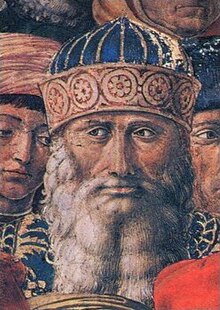Gemistos Plethon | |
|---|---|
 Portrait of Gemistos Plethon, detail of a fresco by acquaintance Benozzo Gozzoli, Palazzo Medici Riccardi, Florence, Italy. | |
| Born | 1355/1360 |
| Died | 1452/1454 (aged 92–99) |
| Era | Renaissance philosophy |
| Region | Western philosophy |
| School | Byzantine philosophy Neoplatonism |
Main interests | Plato's Republic, Ancient Greek religion, Zoroastrianism |
Notable ideas | Comparing the similarities and differences between Plato and Aristotle |
Georgios Gemistos Plethon (Greek: Γεώργιος Γεμιστὸς Πλήθων; Latin: Georgius Gemistus Pletho c. 1355/1360 – 1452/1454), commonly known as Gemistos Plethon, was a Greek scholar[4] and one of the most renowned philosophers of the late Byzantine era.[5] He was a chief pioneer of the revival of Greek scholarship in Western Europe.[6] As revealed in his last literary work, the Nomoi or Book of Laws, which he circulated only among close friends, he rejected Christianity in favour of a return to the worship of the classical Hellenic gods, mixed with ancient wisdom based on Zoroaster and the Magi.[7]
In 1438–1439 he reintroduced Plato's ideas to Western Europe during the Council of Florence, in a failed attempt to reconcile the East–West schism. Plethon also formulated his political vision in several speeches throughout his life. The boast in one of the speeches that "We are Hellenes by race and culture" and his proposal of a reborn Byzantine Empire following a utopian Hellenic system of government centered in Mystras, have generated discussion about Byzantine and modern Greek identity.[8] In this regard, Plethon has been labelled both "the last Hellene"[9] and "the first modern Greek".[10]
- ^ Niketas Siniossoglou, Radical Platonism in Byzantium: Illumination and Utopia in Gemistos Plethon, Cambridge University Press, 2011, p. 3.
- ^ James Hankins, Humanism and Platonism in the Italian Renaissance, Volume 1, Ed. di Storia e Letteratura, 2003, p. 207.
- ^ Sophia Howlett, Marsilio Ficino and His World, Springer, 2016, p. 42.
- ^ Humphreys, Sarah C.; Wagner, Rudolf G. (2013). Modernity's Classics. Springer Science & Business Media. p. 125. ISBN 978-3-642-33071-1.
- ^ Hanegraaff p.29-31
- ^ Richard Clogg, Woodhouse, Christopher Montague, fifth Baron Terrington (1917–2001), Oxford Dictionary of National Biography, Oxford University Press, Jan 2005
- ^ Hanegraaff p.38
- ^ Makrides, (2009) p.136"
- ^ Woodhouse, C.M. (1986)
- ^ Zervas, (2010). p.4